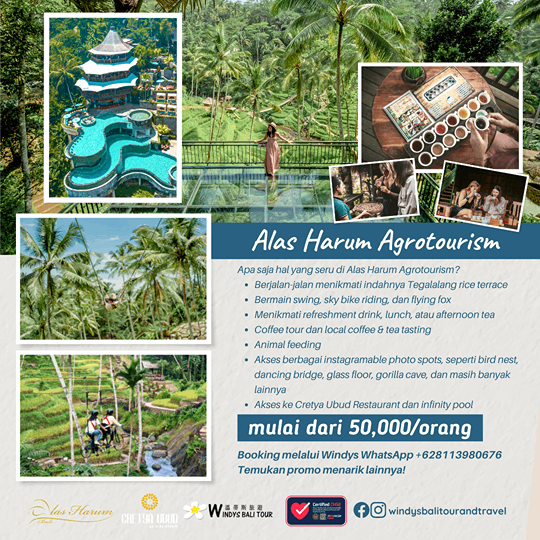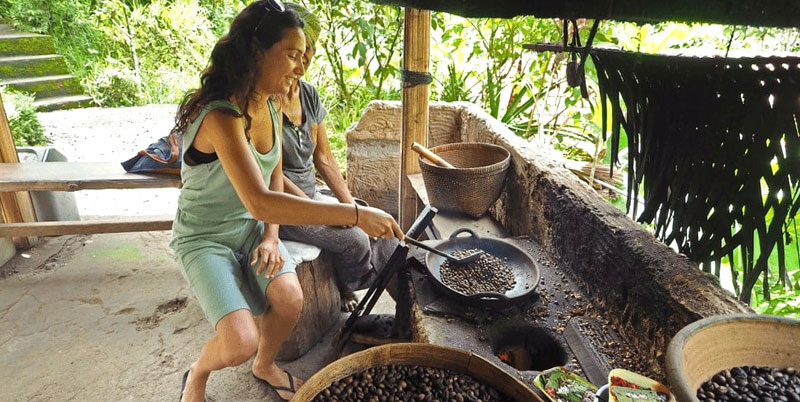Leading Factors to Experience Agrotourism in Ubud on Your Next Vacation
Wiki Article
Discovering the Rich Society and Awesome Landscapes of Agrotourism in Ubud
Ubud, frequently celebrated as the heart of Bali, offers a special chance for those looking for to experience agrotourism that flawlessly mixes cultural richness with amazing landscapes. As tourists navigate with Ubud's dynamic tapestry of traditions, they are invited to reveal the stories behind each cultural practice and landscape feature.Uncovering Ubud's Cultural Heritage
Nestled in the heart of Bali, Ubud acts as a vivid center for those excited to explore the island's abundant social heritage. Recognized for its imaginative customs, Ubud is a hub where ancient practices meet modern expressions, developing a distinct tapestry of cultural experiences. Visitors are attracted to its myriad of temples, galleries, and workshops, each using a look into Bali's creative and historical heritage.Central to Ubud's social attraction is the Ubud Royal residence, a considerable landmark that stands as a testimony to the area's royal heritage. The royal residence often organizes traditional dancing performances, providing a genuine insight into Balinese narration through dancing and music. Moreover, the roads of Ubud are lined with galleries showcasing jobs of both distinguished Balinese artists and arising skills, mirroring the island's vibrant art scene.

Immersive Agricultural Experiences

Additionally, Ubud's agrotourism initiatives typically include workshops on lasting farming techniques. These workshops highlight the value of organic farming, permaculture, and biodiversity conservation, usually under the guidance of well-informed specialists. They work as an instructional platform for travelers, promoting a deeper gratitude for the details of sustainable agriculture.
In addition, visitors can discover coffee and cacao plantations, where they find out about the procedures of farming and manufacturing. Guided trips use thorough explanations of each step, from bean to mug or cacao sheathing to delicious chocolate bar, improving the overall understanding of these considerable agricultural products.
These immersive experiences not only enrich site visitors' understanding of Ubud's farming heritage but also promote lasting tourism methods, guaranteeing the conservation of these social landscapes for future generations.
Beautiful Rice Terraces and Landscapes
Structure on the immersive agricultural experiences, visitors are drawn to the fascinating scenic rice balconies and landscapes that define Ubud's countryside. The famous Tegalalang Rice Terraces are specifically prominent, providing an elegant display of Balinese ingenuity in farming. These balconies are not just useful yet additionally act as a testimony to the harmonious relationship in between the Balinese people and their setting. The subak irrigation system, a UNESCO-recognized social heritage, showcases a sustainable and old technique of water administration that remains to sustain regional agriculture.As visitors pass through the winding paths via the balconies, they are met breathtaking views that stretch throughout verdant areas, stressed by swaying coconut hands and the distant silhouette of Mount Agung. The landscape offers a calm backdrop that invites reflection and appreciation you could look here of nature's beauty (Agrotourism in Ubud). For those thinking about photography, the ever-changing light and shadows cast by the daybreak or sundown supply many opportunities for catching magnificent images
Beyond the terraces, Ubud's rolling hills and lush greenery produce a diverse tapestry that beckons exploration. Treking trails meander with these landscapes, permitting visitors to get in touch with the land and experience the tranquil rhythm of rural life.
Farm-to-Table Culinary Delights
In the middle of the natural elegance of Ubud's landscapes, the farm-to-table motion provides a genuine culinary experience that connects site visitors with the region's agricultural heritage. This method celebrates the cooperative relationship in between the land and its fruit and vegetables, with neighborhood farms providing fresh, natural active ingredients to Ubud's innovative chefs. Site visitors are invited to take part in a gastronomic trip where the origins of each ingredient are transparently showcased.In Ubud, farm-to-table eating transcends plain usage; it comes to be an educational experience. Restaurants often offer guided scenic tours of the farms providing their kitchens, enabling diners to witness lasting farming techniques firsthand. This connection cultivates a deeper appreciation for the thorough care that enters into growing the crops and increasing livestock.
The culinary offerings show the abundant variety of Ubud's farming landscape, featuring meals that highlight seasonal fruit and vegetables and typical Balinese flavors. From lively here salads teeming with exotic eco-friendlies to aromatic curries infused with fresh natural herbs, each plate is a testimony to the region's bountiful harvests.
Additionally, the farm-to-table ethos supports regional farmers and areas, making certain that agricultural customs are maintained while advertising economic sustainability. This movement emphasizes a commitment to quality, sustainability, and the event of Ubud's distinct terroir.
Involving With Neighborhood Artisans
Many visitors find themselves astounded by the detailed workmanship of Ubud's local artisans, whose job reflects the area's abundant social heritage. These craftsmens, typically masters of their craft, contribute dramatically to Ubud's vibrant cultural landscape. From typical batik fabrics to diligently carved wooden artifacts, each item narrates interwoven with generations of experience and practice.Engaging with these artisans provides a distinct opportunity to delve deeper into Balinese culture. Many workshops offer hands-on experiences, where travelers can find out strategies given with centuries. These interactive sessions not only foster appreciation for the artisans' abilities yet likewise offer a meaningful link to the area's background and practices.
Visitors can check out artisan towns such as Mas, renowned for its fine wood carvings, or Celuk, famous for dig this beautiful silver fashion jewelry. Here, one can witness the devotion and accuracy needed to create each work of art. Investing in straight from these craftsmens makes sure that the proceeds sustain regional communities and sustain typical methods.
In Ubud, involving with regional artisans is not just a vacationer activity; it is an improving cultural exchange that improves the agrotourism experience, leaving visitors with a much deeper understanding and gratitude of Bali's imaginative heritage. - Agrotourism in Ubud
Verdict
The exploration of Ubud's agrotourism offers a profound appreciation for Balinese social heritage and all-natural grandeur. Jointly, these components foster a deeper understanding and recognition of Ubud's withstanding natural and cultural appeal.Central to Ubud's social appeal is the Ubud Palace, a considerable spots that stands as a testimony to the area's imperial heritage.Ubud offers a myriad of immersive agricultural experiences that allow visitors to engage deeply with the island's agrarian way of life.Building on the immersive agricultural experiences, site visitors are drawn to the captivating picturesque rice balconies and landscapes that define Ubud's countryside.In the middle of the natural charm of Ubud's landscapes, the farm-to-table motion uses an authentic cooking experience that attaches site visitors with the area's farming heritage.Lots of site visitors discover themselves captivated by the intricate workmanship of Ubud's neighborhood craftsmens, whose work shows the region's rich cultural heritage.
Report this wiki page